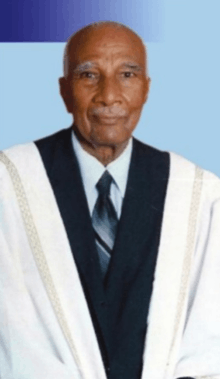Daoud Mustafa Khalid
Daoud Mustafa Khalid (Arabic: داؤود مصطفى خالد; 10 August 1917 – 3 June 2008) was a prominent Sudanese physician and neurologist.[1][2] He was known as the ''founding father of medicine in Sudan''.[1]
Daoud Mustafa Khalid | |
|---|---|
 | |
| Born | August 10, 1917 |
| Died | June 3, 2008 (aged 90) |
| Nationality | Sudanese |
| Education | Kitchener School of Medicine |
| Occupation | Neurologist |
Early life
Daoud was born in Tuti Island, on 10 August 1917.[3]
Career
Daoud studied medicine at Kitchener School of Medicine in 1936. His outstanding educational career included prizes of anatomy, physiology pathology, medicine, and surgery.[3]
From 1943 to 1949, Daoud worked in several hospitals across Sudan, including Meroë, Wad Medani, and Omdurman Teaching Hospital. He was well known for his responsibility towards all his patients without any discrimination. He was universally accepted as a leader, and was honored and well respected physician.[3]
In 1950, Daoud get a scholarship and moved to the UK to study internal medicine. In 1952, he was among the few Sudanese physicians at that time to obtain a Membership of the Royal Colleges of Physicians.[3] Daoud retained to Sudan in 1952, and worked physician at Atbara Hospital for one year. He then returned to Omdurman Teaching Hospital, and also worked as a part-time lecturer in department of medicine at University College Khartoum. [1]
In 1960, Daoud moved to the UK again for 1 year for further medical training. In 1963, he became the first Sudanese head of department of medicine at University of Khartoum. In 1965 he was promoted to professor of medicine. In 1967, with Professor Hussin Suliman Abusalih, Daoud cofounded the Sudanese Society of Neurosciences (SSNS).[4] In 1974 he became the dean of Faculty of Medicine, University of Khartoum, and one year later, was awarded the title of professor emeritus.[3] It's well known that he established neurology as a specialty in Sudan.[5]
Awards
- Prizes of anatomy, physiology pathology, medicine, and surgery at Kitchener School of Medicine (1936 - 1941).[3]
- Honorary Doctorate in Sciences by University of Khartoum (1988).
- Elgomhoria medal (1978).
- El Nilein medal (1989).
- El Injaz Star medal (1990).
- “Martyr Elzubeir Mohamed Salih Prize” for distinguished and excellent scientific achievements (2001).
- Medal of Sciences and Arts, First Class Arabic Republic of Egypt (1983).
- Honorary Doctorate in Sciences by University of al-Jazirah (1998).[6]
Eponymous
- Daoud Mustafa Hall (Faculty of Medicine, University of Khartoum).[7]
- Daoud Research Group (founded by professor Abbashar Hussein).[8]
- Daoud Mustafa Hall (Tuti Island's Family Health Medical Center).[9]
- Daoud Mustafa Khalid Ward (Omdurman Teaching Hospital).[10]
Death
Daoud died on 3 June 2008 at his home.[6]
References
- El Safi, Ahmed. (2009). Daoud Mustafa Khalid : his life and work : milestones in Sudanese internal medicine, neurology, & medical education. Sudan Medical Heritage Foundation. ISBN 978-99942-941-5-2. OCLC 764564321.
- "Tribute to the late Prof. Daoud Mustafa Khalid". www.smj.eg.net. Retrieved 2020-06-12.
- "Daoud Mustafa-Khalid | RCP Museum". history.rcplondon.ac.uk. Retrieved 2020-06-13.
- "Sudanese Society of Neurosciences". Retrieved 13 June 2020.
- "The Kitchener School of Medicine: 20th-century medical education in Sudan | RCP Museum". history.rcplondon.ac.uk. Retrieved 2020-06-14.
- Yassin Salih, Professor Salih (2008). "Faculty of Medicine: Professor Daoud Mustafa Khalid". Faculty of Medicine, University of Khartoum Blog. Retrieved 2020-06-13.
- "Khartoum Medical Students Association Official Telegram Channel". Telegram. 12 March 2020. Retrieved 2020-06-14.
- "Daoud Research Group". Daoud Research Group. Retrieved 2020-06-14.
- "Sudanese Society of Family Physicians الجمعية السودانية لإختصاصيى طب الأسرة". www.facebook.com. Retrieved 2020-06-14.
- Abdellaf, Muaz (10 May 2016). "Queen Square Alumnus Association newsletter" (PDF). Retrieved 15 June 2020.